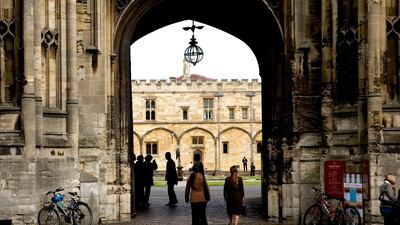Faced with a potentially catastrophic drop in numbers of international students due to coronavirus, British universities are working hard to adapt.
Key to the problem is reassuring undergraduates still planning to start in September that their experience will be worth it, despite an often-hefty price tag.
In the UK, which is enduring Europe’s worst outbreak of the virus, institutions understand significant changes to the nature of university life are inevitable.
But in an effort to prevent widespread deferrals this year, most are still planning in-person teaching come the autumn rather than solely online classes.
Last week, a survey by the British Council found that nearly 14,000 fewer international students were due to arrive at UK universities this year.
Those from abroad often pay fees of around four times more than their British counterparts, providing lucrative additional revenue to the institutions they join.
Now though, amid ongoing travel disruptions due to Covid-19, their attendance is in real doubt.
Nearly a third (29 per cent) of prospective international students told the British Council they were likely to delay or cancel their plans to study.
Students who have applied through the Universities and Colleges Admissions Service (Ucas) have until Thursday to make a final decision on their offers.
Face-to-face contact is likely to be reduced
Students who stick to their plans to attend UK universities will have a markedly different experience this academic year.
The country’s lockdown rules mean face-to-face contact is likely to be significantly reduced, as universities seek ways of limiting the chances of the virus spreading on their campuses.
Several of the country’s most popular destinations for visiting students, including Cambridge, have announced that all lectures will be moved online until the summer of 2021.

Most universities, however, have said they will pursue a “blended” approach to classes, creating smaller, face-to-face study groups combined with online teaching.
Meanwhile, nine in 10 are planning to offer face-to-face teaching and social opportunities from the moment students arrive, but these are likely to be supplemented by online alternatives.
Alistair Jarvis, chief executive of UUK, said “most students can expect significant in-person teaching” as well as a “wide range of social activities”.
‘Bubbles’ will group students together to limit the risk of virus outbreaks
Universities UK unveiled a series of proposals this month outlining how its member institutions might adapt to provide the best experience for their students during the pandemic.
The body suggested students could be grouped into “bubbles” to live and study together in an effort to limit the potential for Covid-19 to spread on campus.
Under the arrangement, those studying the same courses would be grouped together and share the same halls of residence.
Students’ social lives are likely to face significant disruption, too, but the challenges are greater for those taking up places for the first time this autumn. Some universities are rolling out entire programmes of online events to welcome new students.
Universities are confident they can adapt to the change in circumstances and believe technology will enable them to provide experiences worth the high cost of entry.
Professor Julia Buckingham, Vice-Chancellor of Brunel University, thinks students will “embrace the changes”.
“There is some wonderful technology available such as virtual reality so I do see this as a really exciting opportunity,” she told BBC radio.
“If I'm really honest, it's something that I've been wanting to do for a long time.”
Students are worried their grades will be affected
At University College London (UCL), which in 2018 hosted the highest number of international students of any British university, students have been given details of some of the new changes brought in due to the virus.
Abdallah Abbas, the incoming president of UCL’s Arab and North African Society, said the campus would reopen in September, with libraries and buildings accessible to students.
"We have to wear face masks and they are making a one-way system," he told The National.
“They’re working on providing high quality online lectures since we have to follow government guidelines.
“It’s unlikely we will have packed lecture theatres.”
Despite the balanced approach to allowing use of the campus, some students are concerned their grades will be affected by the disruption.
Mr Abbas, 20, said many were “feeling genuinely scared” that they would not be able to work as effectively as they normally would given the changes to teaching arrangements.
Students used to remote working should feel at home
For some international students, starting or returning to university in 2020 will be much closer to business as usual.
Students from the UAE, for example, often never leave their country for their education abroad, preferring instead to study at educational hubs in the emirates.
Mr Abbas said his university would have to factor in those students planning to study from overseas.
“The general sentiment is that they [universities] need to be flexible to changing circumstances,” he said.
He urged all institutions to “provide alternative content for anyone that can’t make it to London, so that they don’t miss out on any learning”.




